The Portland City Council amended the land use code to allow up to four units on all residential lots on the mainland, and up to three on island lots. It also eliminated parking requirements for these uses.

Spurred on by citizen activism, Maine’s statewide zoning and housing reform law (LD2003) and a significant housing shortage, Portland’s City Council voted 8-1 on December 18th to allow multifamily housing on all residential lots in the city. These changes built on a more modest reform proposal brought forward by the City Planning Board that would have met LD2003’s requirements but limited some kinds of multifamily housing on existing lots. The reforms that passed allow up to four units on any residential lot on the mainland and three units on lots on Casco Bay islands within city limits. The changes approved also eliminated parking requirements for these units, as well as some dimensional limitations such as lot area per dwelling unit.
Portland has struggled with housing affordability issues for a long time. The in-migration from other states was accelerated by the COVID-19 pandemic and has made it hard for people growing up in Portland to remain in their hometown. In response, the city has implemented a number of housing policies of varying effectiveness, beginning around 15 years ago with restrictions on removing housing units from the market, adding an inclusionary zoning requirement in 2015, requiring hotels to pay for affordable housing, and zoning changes to allow up to two Accessory Dwelling Units on every lot. In addition, citizen referenda have increased the inclusionary zoning requirements and implemented one of the strictest rent control programs in the county. The city has also worked to finance affordable and workforce housing and provide surplus land for its development.
Portland’s Council's proactive efforts to exceed the requirements of LD2003 put them among a group of communities seeking to meet a December 31st state deadline for compliance with that law. Passed in 2021, LD2003 requires that communities allow up to four units on any residential lots in designated growth areas, and up to two units on other residential lots. LD2003 also requires that communities allow Accessory Dwelling Units on all residences and required that communities allow for density bonuses and other zoning relief for developments that are in growth areas and meet affordability requirements. Portland’s new changes go beyond these requirements by designating the entire mainland a growth area, as well as eliminating parking requirements.
While many communities in Maine are working to meet the LD2003 requirements, others have not. The suburb of Cape Elizabeth, for example, approved zoning changes brought forth through a local process to comply with the state law, only to see those changes largely reversed when election day changed the constitution of the Town Council.
FULL STORY: Councilors and Urbanists, Backed Both by Chamber of Commerce and DSA, Pass Citywide Zoning Reform

Planetizen Federal Action Tracker
A weekly monitor of how Trump’s orders and actions are impacting planners and planning in America.

Congressman Proposes Bill to Rename DC Metro “Trump Train”
The Make Autorail Great Again Act would withhold federal funding to the system until the Washington Metropolitan Area Transit Authority (WMATA), rebrands as the Washington Metropolitan Authority for Greater Access (WMAGA).

The Simple Legislative Tool Transforming Vacant Downtowns
In California, Michigan and Georgia, an easy win is bringing dollars — and delight — back to city centers.

The States Losing Rural Delivery Rooms at an Alarming Pace
In some states, as few as 9% of rural hospitals still deliver babies. As a result, rising pre-term births, no adequate pre-term care and harrowing close calls are a growing reality.

The Small South Asian Republic Going all in on EVs
Thanks to one simple policy change less than five years ago, 65% of new cars in this Himalayan country are now electric.

DC Backpedals on Bike Lane Protection, Swaps Barriers for Paint
Citing aesthetic concerns, the city is removing the concrete barriers and flexposts that once separated Arizona Avenue cyclists from motor vehicles.
Urban Design for Planners 1: Software Tools
This six-course series explores essential urban design concepts using open source software and equips planners with the tools they need to participate fully in the urban design process.
Planning for Universal Design
Learn the tools for implementing Universal Design in planning regulations.
Smith Gee Studio
City of Charlotte
City of Camden Redevelopment Agency
City of Astoria
Transportation Research & Education Center (TREC) at Portland State University
US High Speed Rail Association
City of Camden Redevelopment Agency
Municipality of Princeton (NJ)





























